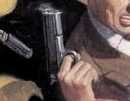|
Reflections in a Double Bourbon - Ian Fleming's Goldfinger
'Returning from Mexico after cracking a squalid heroin ring, Bond is
only too happy to stay at a Miami hotel and figure out how Auric
Goldfinger is cheating at Canasta. It seems that the Bank of England
are interested in him too, and charge 007 to discover what the richest
man in England is doing with the vast quantities of gold he has
acquired - and what his connection is with SMERSH, the Soviet
spy-killing organization. Up against Goldfinger and his henchman Oddjob
- a bowler-hatted thug with a Black Belt in Karate - Bond soon finds
that this criminal genius’s schemes are greater, and more lethal,
than anyone could have imagined...'
Goldfinger was the seventh James Bond novel to be written by Ian
Fleming and was first published in 1959. The book is split into three
sections each with several chapters and my paperback copy is 222 pages
long. The plot of Goldfinger begins with Bond on his way back from a
mission in Mexico. Bond is recognized by Junius Du Pont who he met
previously at Royale-les-Eaux. Du pont is being cheated at cards by
millionaire Auric Goldfinger and Bond rumbles Goldfinger's scheme and
makes him confess before heading for New York with Jill Masterson - the
young woman who helped Goldfinger to cheat. A week later though, Bond
is asked to see M who tells 007 he is required to investigate a
gold-smuggling case. The Bank of England suspect none other than Auric
Goldfinger is behind a large quantity of gold going out of the market
and M believes that the mysterious millionaire could be acting on
behalf of SMERSH...
With locations as varied as London, Miami, New York, Switzerland,
Kentucky and, of course, Fort Knox, Goldfinger is an inventive and
interesting addition to the Bond series of books although perhaps not
the very best example of Ian Fleming's work. One minor problem with the
book is that the film version of Goldfinger is so iconic. Those who
have seen the film but not read this (which, let's be honest is
probably most people) might be slightly disappointed by the novel which
was of course given a stylish and more exciting cinematic tweak for the
big screen. A couple of iconic moments from the film are absent here
and Goldfinger's grand scheme makes less sense here than the somewhat
different - but more inventive - one they gave him in Guy Hamilton's
1964 film. In some ways the writers actually improved Goldfinger's plot
for the big screen.
The book is still a lot of fun though and gives Bond two memorable
adversaries in Goldfinger and his personal bodyguard/manservant -
Oddjob. Bond's initial encounter with Goldfinger at the start of the
book is an amusing sequence and sets up the battle of wits that will
play out between the two men over the course of the story. There are
perhaps some plot-holes and coincidences along the way but then this is
a James Bond novel and not Dostoevsky. Fleming's usual careful
descriptions of places Bond stays in and the various locales bring you
into the story and the function of gold in the currency markets and the
economies of nations is interesting to read about although presumably
somewhat dated today. You can tell the author did his research and
Goldfinger's obsession with gold is stranger and more of a fetish here
than in the film.

Fleming's style is very accessible and always entertaining with a good
example of this the golf duel between Bond and Goldfinger at 'Royal St
Mark's' near Sandwich - and it is quite charming by the way to read of
Bond's customised Aston Martin DBIII speeding through Kent locations
such as Herne Bay and Rochester. The golf game takes up quite a few
pages - more than most authors could get away with to be honest - and
yet, as someone who has practically no interest in golf whatsover I
still found it an amusing and mildly gripping set-piece as Goldfinger
attempts to cheat more than once - "As soon as Bond had hit the shot he
knew it wouldn't do. The difference between a good golf shot and a bad
one is the same as the difference between a beautiful and a plain woman
- a matter of millimeters."
The book tries to get inside Bond's head a little more and presents his
thinking more than some other books in the series. At times this gives
Goldfinger more of a detective novel feel as we are allowed to read
Bond's thoughts although it doesn't always seem natural. One slight
problem with the book is that the pacing is perhaps a tad slow up until
the third act. Goldfinger's ultimate caper and the climax of the book
is a lot of fun though with a chemical weapon and some of America's
most notorious gangsters not to mention the high-cheekboned and
vivacious Pussy Galore, one of the most memorable of Fleming's Bond
girls. Goldfinger himself is a short man with a round head, carrot hair
and a bulky body. He carries a million dollars in gold around with him
and gets his kicks by painting women with gold paint - leaving a small
bare patch for the skin to breathe. "Keep away from Mr. Auric
Goldfinger," Bond is warned. "He is a most powerful man. If he wished
to crush you, he would only have to roll over in his sleep to do so."
Goldfinger has a real air of menace at times and is aided by his Korean
karate trained bodyguard Oddjob who who uses his steel-enforced bowler
hat like a lethal sort of boomerang. "I was very impressed by that
chauffer of yours," says Bond. "Where did he learn that fantastic
combat stuff? Where did it come from? Is that what the Koreans use?"
Goldfinger has some enjoyable 'Bond villain speeches' in the book.
As always, it's fun to learn more about Bond with each book. Among the
titbits we pick up here is that Bond - surprisingly for such a British
icon - dislikes tea ("Mud") and also killing - "It was part of his
profession to kill people. He had never liked doing it and when he had
to kill he did it as well as he knew how and forgot about it. As a
secret agent who held the rare double-O prefix - the licence to kill in
the Secret Service - it was his duty to be as cool about death as a
surgeon. If it happened, it happened. Regret was unprofessional -
worse, it was death-watch beetle in the soul." Bond also dislikes short
people for some reason! "It was the short men that had caused all the
trouble in the world." Some of Fleming's Bond musings - on gay people
for example - are rather dated elsewhere it has to be said.
Overall, Goldfinger is an enjoyable and very readable addition to the
Bond series although not quite classic Fleming. The pacing is rather
slow at times but there is much to enjoy nonetheless. A solid spy
thriller with great villains and some nice set-pieces.
- Jake
c 2009
Alternative 007
|

|

